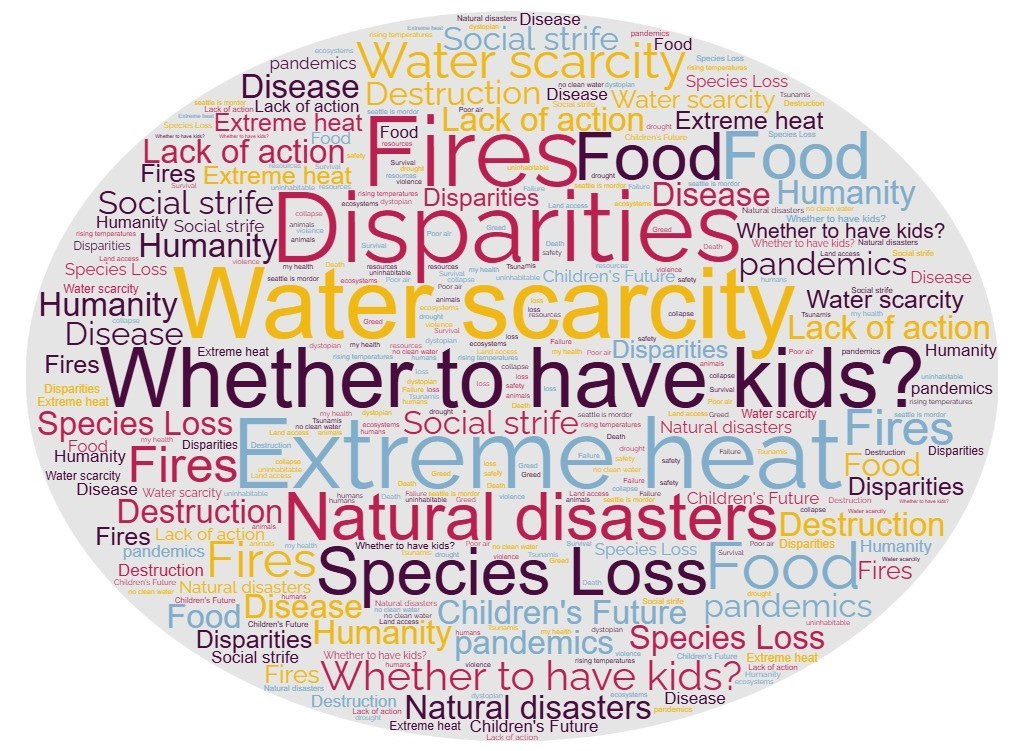Over the last couple of quarters, I’ve asked my students in the University of Washington On-line Master of Public Health program, “If you had to guess, and you do, will humanity survive the climate crisis?” So far, 87% have said “Maybe, but civilization as we know it will not” or, simply, “No."
I follow up with them: “When you think about the changing climate, what worries you most?” They’re good proto-public health professionals and generally worried about the things I would expect—water, food, clean air, heat, diseases, fires.
What always brings me up short is “Whether to have kids.”
Grace (name changed) was a public health graduate student of mine. She’s smart, beautiful, energetic. She wants to make the world a better place. She said to me, “A lot of my friends my age are wondering if it’s even ethical to have kids, with the climate and everything. It’s hard to want to bring kids into this world.” She is not alone. Thirty-five percent of young people in the US said they are hesitant to have children because of concerns about the climate.
I mean, if I literally thought there wasn’t going to be a future, I think I would make different decisions. No future means no consequences. Spend the retirement fund. Take up smoking. Throw away the receipts. Definitely don’t have kids. I get it.
The problem of course, is that I already have kids. And, in all likelihood, there will be a future that very much reflects the choices, policies, and actions we take today.
Concern for the planet is necessary, especially when it spurs us toward environmental stewardship. But, when that concern kindles the fear that it’s already too late and then grows into the belief that we as a species don’t have a future to speak of, this isn’t environmentalism anymore. This is climate despair.
Climate despair is a real problem. First, because it is based on a death of the future that has been, to quote Mark Twain1, “grossly exaggerated.” And second, because our despair keeps us from doing the things we need to do to prevent the worst outcomes of the changing climate. And third, well, it’s hard to get out of bed, let alone lead a social or environmental movement, if you are despairing.
The American Psychological Association points out that despair, even when it is a totally psychologically normal response to the environmental destruction we see in the world, keeps us from actually solving our environmental issues:
“… the psychological responses to climate change, such as conflict avoidance, fatalism, fear, helplessness, and resignation are growing. These responses are keeping us, and our nation, from properly addressing the core causes of and solutions for our changing climate, and from building and supporting psychological resiliency.”
The truth is we’re only doomed if we don’t act. And we don’t have to act alone. There is a huge global movement out there of people who are working create a more equitable and sustainable world. I want to be a part of that. And I want you to be a part of that.
So, Climate Pessimists, we’re going to have to find some hope.
Mark Twain’s Quote About His Own Death Is Greatly Exaggerated (mentalfloss.com) Well, darn it. You knew what I meant though.
This piece is part of my work on my upcoming book titled (for now) A Climate Pessimist Finds Hope. Please comment! Is there something here that makes you think, “well, yeah, but, what about….” Tell me about it! Do I use a particularly persuasive or not persuasive argument? Tell me before the bad stuff ends up in the book!
For more on the book see:




